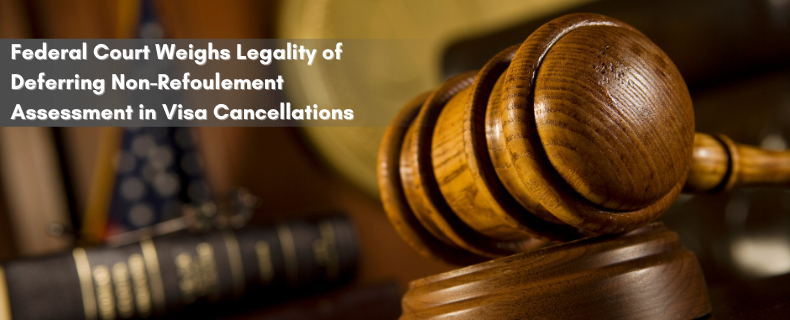
Federal Court Weighs Legality of Deferring Non-Refoulement Assessment in Visa Cancellations
dina045850
Can the government defer assessing a person’s risk of harm upon return to their country of origin — or must it address those risks when cancelling their visa? The Federal Court is set to answer this crucial question that could reshape how non-refoulement obligations are handled in Australia’s migration decisions.
At the heart of the case lies the fundamental international law principle of non-refoulement, which prohibits countries from sending individuals back to a place where they face a real risk of serious harm — including torture, persecution, or death.
The Federal Court is now considering whether it is legally reasonable for decision-makers to defer consideration of these obligations to a future protection visa process, rather than confronting them when deciding to cancel a visa.
A Test of Reasonableness
The Court was asked to determine whether the deferral of non-refoulement considerations — potentially a life-or-death matter — can be considered "legally reasonable." The case raises significant legal and ethical implications for Australia’s immigration and refugee protection systems.
The following key questions are now before the Court:
- Can decision-makers defer, but still be required to engage with the facts?
The Court is examining whether the High Court’s ruling in Plaintiff M1/2021 v Minister for Home Affairs sets a precedent. That ruling acknowledged the government’s ability to defer the formal assessment of non-refoulement but emphasized that the decision-maker may still need to consider the underlying claims of harm when deciding whether to cancel a visa. - Is deferral legally reasonable?
The second question challenges the very reasonableness of postponing this assessment. Can a tribunal or official, in good faith and under the law, delay considering whether someone faces harm abroad — effectively leaving life-threatening concerns unaddressed in a cancellation decision? - Was the Tribunal unreasonable in this case?
Finally, the Court must assess whether the specific Tribunal decision in question — which deferred the assessment — fell short of legal standards and failed to reasonably weigh the individual’s claims of fear and danger.
What’s at Stake?
Legal experts say the Court’s answer could affect a wide range of future cases, particularly where visa cancellations involve individuals who claim they face persecution or danger if deported. Human rights advocates argue that deferring non-refoulement assessments risks exposing people to harm and undermines Australia's international obligations.
“This isn’t just a legal technicality — it’s about whether someone might be sent back to torture or persecution without a fair hearing,” said one immigration lawyer familiar with the case.
A Precedent in the Making
As the Federal Court deliberates, the case is being closely watched by legal scholars, refugee advocates, and policymakers. A ruling that finds the deferral unreasonable could place stricter obligations on decision-makers to consider claims of harm upfront — changing the way cancellation decisions are made across the board.
The judgment, when handed down, may clarify the scope of decision-makers’ responsibilities and reassert the weight of non-refoulement in Australia's migration framework.
For now, the question remains: Can a system that waits to assess danger until it’s too late be considered just?
Stay tuned with Growmore Immigration for expert insights and timely updates on this case and other key developments in Australian immigration law.
Comments

Become a Growmore Community Member and Get Expert Support at Special Offer
schedule session with our RMA
